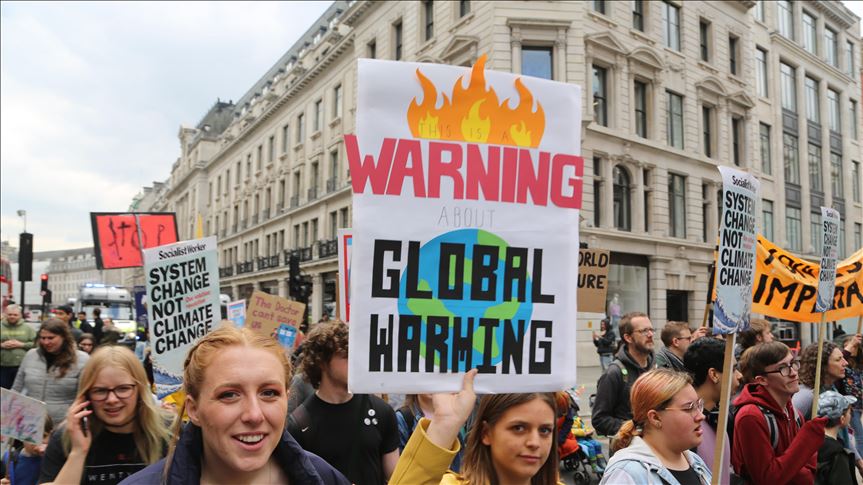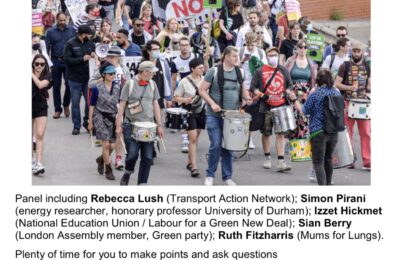Polling shows huge public support for climate action, and a Green New Deal could revive the very parts of the economy worst hit by Covid and austerity – but Labour is refusing to make a bold case for change.

This has been brought into sharp focus by Keir Starmer’s recent flight to Edinburgh to film a campaign ad. The stunt could have easily been mistaken for an advert for British Airways, and only adds to the impression that climate still isn’t a priority. This is in contrast to the positive work being done by Ed Miliband as a Green New Deal champion in his shadow cabinet climate brief.
The leadership’s latest foray into climate policy, with a £30 billion plan to create 400,000 green jobs, appears to be a policy rehash from November last year. When permanent job losses from Covid-19 are expected to reach nearly two million this decade, this isn’t the time for half measures: analysis from Green New Deal UK found that with an investment of £68 billion, a total of 1.2 million green jobs can be created in just two years across the UK. That’s the level of ambition needed to face up to the climate crisis.
There is a very real possibility that Labour’s leadership will be—and perhaps already are—outflanked by a government drenched in green wash. The Tories aren’t afraid to talk the talk, regardless of whether or not they walk. Recently, they’ve shown themselves unafraid to use the financial tools of the state to intervene in the market: this week, as the European Super League fell apart before all of our eyes, culture secretary Oliver Dowden declared that ‘we will not have our national game taken away from us for profit’, and Johnson promised to utilise a ‘legislative bomb’ to curb breakaway plans. This is a party well able to play to popular public sentiment – and Labour needs to get on top of it.
Climate action is exceedingly popular with the general public, which means a radical economic policy platform can and must provide the bedrock for Labour at the next election – in fact, there’s an appetite for the government to go further and faster. A poll from The Climate Coalition earlier this year found that 60 percent of voters believed those in power should be doing more to tackle the climate crisis.
And the notion that support for climate action is predominantly emerging from cities and the ‘metropolitan elite’ has been consistently debunked. A Centre for Towns study, aptly named ‘More United Than You’d Think’, shows that the groundswell of public sentiment and concern over the climate crisis was also present in less densely populated towns across the UK. The report found that ‘there is broad public support for a Green New Deal, across all types of place’ and that ‘at least two-thirds of the public are behind the idea of investment in green jobs and energy to address climate change.’ Surely this—not flags, nor crime and punishment—should be what Labour uses to mobilise not just its base, but the wider electorate.
In the ‘Red Wall’, where an increased vote share for the Tories in 2019 filled the Labour camp with an enduring fear, there is huge potential for bullish green economic investment. New research from Green New Deal UK shows that in constituencies like Bolsover, which the Tories gained from Labour stalwart Dennis Skinner, investment into green jobs would replace all the permanent job losses from Covid-19 in just two years, creating a net gain of 1,202 jobs. Hartlepool, the current centre of a by-election frenzy, could see a green boost of 3,361 jobs after taking into account the permanent unemployment caused by Covid-19.
These significant numbers are the potential result of targeted investment that could form not only election-winning promises, but transformative policies for constituencies across the Red Wall and in every corner of the UK.
There’s a desire for a just transition and good-quality green jobs in these parts of the UK, too. IPPR’s Citizens’ Jury project in Tees Valley and County Durham arrived at recommendations that could form a radical, progressive green platform for Labour: jurors recommended a national blueprint for low-carbon work with the flexibility to meet local needs, raised taxes on high-carbon industries with funds ring-fenced for local transition, and a government-provided green job wage guarantee, accompanied by income tax relief for those in low-carbon sectors. These are popular policies.
When you add younger people to the mix, the Labour leadership’s climate silence seems even more nonsensical. Countless surveys have shown that climate change is the top concern for young Brits, with nearly two-thirds of 11-18 year olds—some of whom will be voters in the next election—saying the environment is the most important issue for the country. More alarming is a survey from Newsround which found that most children in the UK are suffering from climate anxiety, and that two in five children don’t trust adults to address the climate crisis.
When these children reach voting age, the climate crisis will not only be a political question – it will be shaping their everyday reality. The party urgently needs to reconnect with younger demographics after the groundswell of youth support for the previous Corbyn leadership. A recent poll of 2019 Labour voters found that 56 percent of 18-24-year-olds thought that Jeremy Corbyn was the best leader of the Labour Party at this specific moment, with Starmer only rousing 29 percent of those same respondents.
This lack of interest in Starmer could quickly slide into indifference – especially when young people are effectively being left behind by the pandemic response. Figures from the Office of National Statistics this week shows that employment among under-25s has reached a record low. The perfect remedy is a bold, progressive, and empowering Green New Deal commitment that will draw young people’s attention to Labour as a credible political force for climate action.
Labour and Starmer have an opportunity to ramp up their rhetoric on climate and offer a bold vision that could transform communities across the UK, including those in the ‘Red Wall’ where disillusion with the party has translated into lost political ground. If the leadership wants to commit to providing a stirring vision of the future—a genuine alternative to the present—then a radical Green New Deal is the vote-winner.



